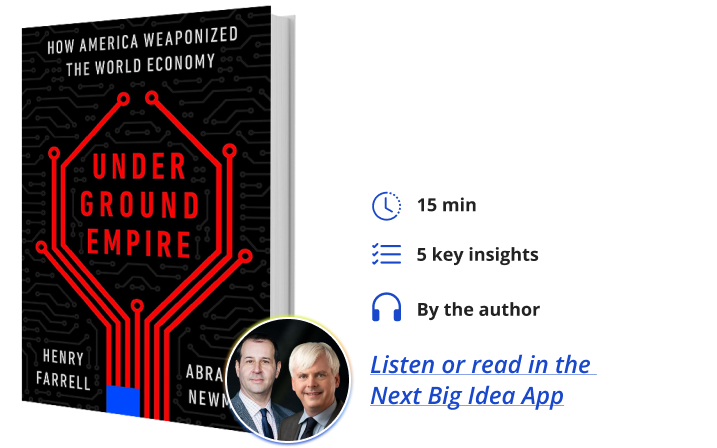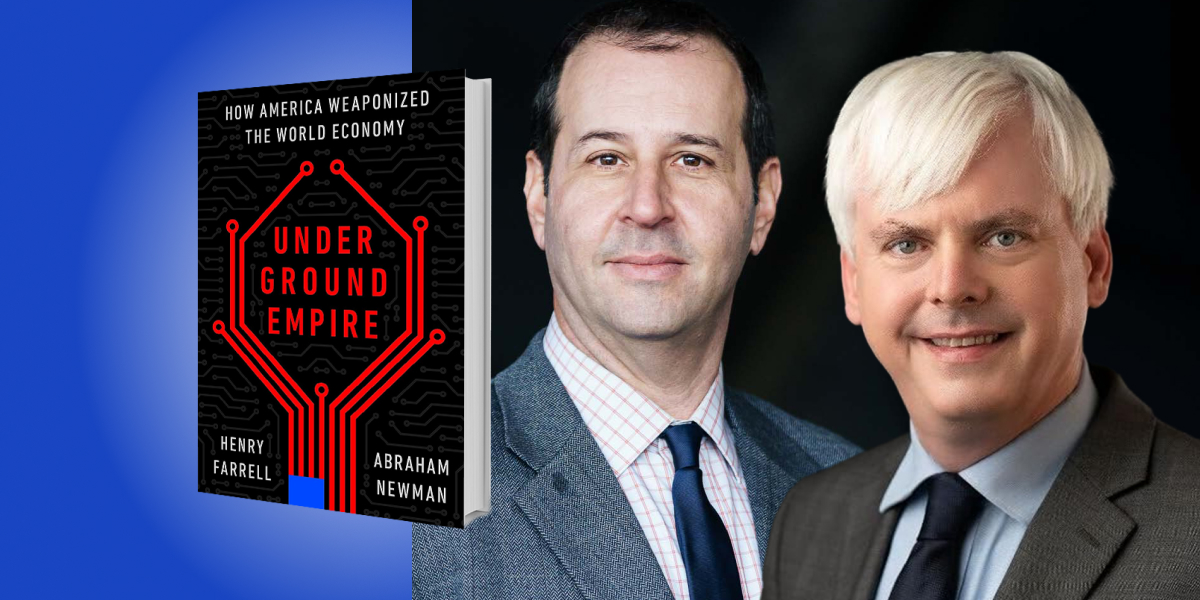Abraham Newman is a professor at the School of Foreign Service and Government Department at Georgetown University. He serves as a frequent commentator on international affairs, appearing on news programs ranging from Al Jazeera to Deutsche Welle and NPR. His work has been published in leading outlets like the New York Times, The Washington Post, Nature, Science, Foreign Affairs, Foreign Policy, Harvard Business Review, and Politico.
Henry Farrell is the SNF Agora Professor at Johns Hopkins SAIS, the 2019 winner of the Friedrich Schiedel Prize for Politics and Technology, Editor-in-Chief of The Monkey Cage at The Washington Post, and co-founder of the popular academic blog, Crooked Timber. A member of the Council on Foreign Relations, Farrell has written for publications such as the New York Times, the Financial Times, Foreign Affairs, Foreign Policy, Washington Monthly, Boston Review, Aeon, New Scientist, and The Nation.
Below, co-authors Abraham and Henry share 5 key insights from their new book, Underground Empire: How America Weaponized the World Economy. Listen to the audio version—read by Abraham—in the Next Big Idea App.

1. Globalization is not what we thought it was.
For several decades there was a popular story about how globalization worked. It’s probably easily recognizable by Thomas Friedman’s book, The World Is Flat. It’s an image of globalization being decentralized, with companies and firms in the lead. In this world, states have been neutered, pushed to the sides, and companies have built world-spanning networks to conduct commerce, make money, and grow wealth.
The idea of decentralized network of firms and companies, however, is really just a myth. In many of the core areas of the global economy, just a few companies dominate, whether it’s your iPhone being produced by Apple, the chip on that iPhone made by TSMC, a semiconductor maker in Taiwan, or the financial transactions that you make over that phone, which are often made through just a few banks in the global economy. These core companies have created what we think of as choke points in the global economy. They’ve centralized markets in order to dominate them and to extract rents. Now, governments are waking up to that.
2. Governments, most importantly the United States government, are understanding this globalized structure and they’re using that to fight their battles.
Over the last several decades, starting with the terrorist attacks in 9/11, the U.S. government started to think about how they could manage a world where global markets had been turned against them, where terrorists had used these global markets to attack their homeland. Rather than relying on an existing plan, a bunch of different agencies scrambled to make sense of this crisis and bring in new tools to solve these problems.
In agencies like the National Security Agency, the Treasury Department, and others, they discovered maps, systems, and structures in the global economy that they could use to their advantage. Most importantly, they could use these maps to uncover how our enemies were working, to surveil them and understand their inner workings. They could then target them. Often, they were blocked or excluded from the global economy.
“They could use these maps to uncover how our enemies were working, to surveil them and understand their inner workings.”
One of the critical symbols of this effort was the organization Swift in Belgium. It’s basically like a back-office post office for banks, where banks share information with each other about which transactions are being conducted and why. The U.S. government started to use this central point in the global financial system to understand first what terrorists were doing, then what adversaries like Iran or North Korea were doing. It then started to cut these countries out of this system. This was just the beginning of an effort by governments to either use these choke points to observe their enemies or to try to strangle them.
3. The global economy has become a battlefield and firms need to prepare.
Formerly, when companies thought about political risk, their solution was to go to a country far away, fearing that their investment might get taken by the government, or nationalized. So previously, firms’ main worry was their host government.
Now there’s a new type of political risk, a new concern that firms face, which are the very channels they use to engage in global markets. Production networks spreading out manufacturing system across countries has created new forms of political risk, ones that we saw so prominently during the COVID crisis.
Moreover, the systems or networks that they use have become the channels of this political risk, whether it’s information technology or financial architectures. Firms like Deutsche Bank, TSMC, or Apple are increasingly the foot soldiers. They are being called upon by governments in order to act and to fight their battles. So now companies have to face a question: What do they do in this new world and how do they protect their business model as they do it?
4. The use of these infrastructures of the global economy by states wasn’t a big overarching orchestrated plan, but really came about by accident.
Why is that important? The reason is that this came out of a crisis response, a response to 9/11. It then grew as the government faced new crises, nuclear threats by countries like Iran or North Korea, and then the invasion by Russia of Ukraine.
“The ratcheting up of these new economic weapons has the potential to undermine the global economy, and globalization as we know it.”
At these key moments, government grabbed for these new tools and built upon them, but there hasn’t been the time to really think about the consequences. So what does it mean to use these tools? What does it mean for our adversaries? What will it mean for our friends and what might it mean for the global economy? The ceiling of what we thought was possible has become the new floor. The ratcheting up of these new economic weapons has the potential to undermine the global economy, and globalization as we know it. Our concern is that, as in a strategy of escalation, we could see a fragmentation in globalization and many countries might pull back. These countries might look more into themselves and may no longer engage in the global markets that have brought so much wealth and prosperity to communities across the globe.
5. Globalization itself could be put at risk unless we create a new language that will maintain stability.
When nuclear weapons came on the scene, they didn’t come with a rule book. People didn’t know how to use them responsibly or to make sure that they wouldn’t lead to unanticipated consequences. To do that, scholars and policymakers got together and developed a new language and systems to prevent these kinds of weapons of mass destruction from being used. Things like mutually assured destruction (MAD) had to be invented. It’s now a cornerstone of how the nuclear age works.
But at the beginning, people didn’t know what the rule book was. We are now at a similar moment, when we need a new set of guidelines, guardrails, tools to understand when these tools should be used and what the risks are of using them. Most importantly, we need to give policymakers these ideas so that they can use sanctions, export controls, investment screening, and other economic weapons in a responsible way that guarantees our safety.
These economic weapons can also be used to make the world a better and safer place. One of the areas that we note is in the case of climate change. You could imagine turning some of these tools like sanctions in order to promote our future sustainable planet, one in which we can all live and prosper in the future.
To listen to the audio version read by co-author Abraham Newman, download the Next Big Idea App today:
































